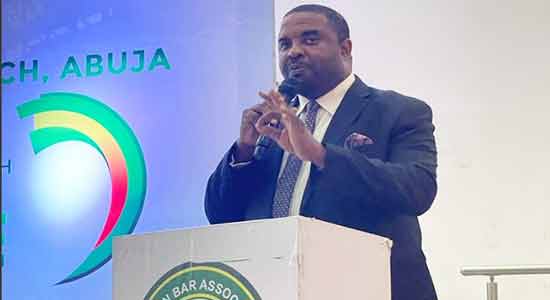Court Affirms NBA, ECNBA’s Withholding Of 2024 Election Data, Cites Data Protection, Awards N200,000 Costs

The Federal Capital Territory (FCT) High Court in Abuja has dismissed a suit filed by Tobenna Erojikwe against the Incorporated Trustees of the Nigerian Bar Association (NBA) and three others, seeking access to critical election data from the NBA’s 2024 National Elections, ruling that the refusal to release the information was lawful and awarding N200,000 in costs against the claimant.
In a judgment delivered on 26th March, the FCT High Court, presided judge, struck down Tobenna Erojikwe’s legal challenge against the NBA, its Electoral Committee (ECNBA), and ElectionBuddy, the firm that facilitated the July 20, 2024, NBA National Elections.
Erojikwe, represented by Mana B. Phar, sought court orders to compel the defendants—represented by D.I. Kolade, Asmau Ahmed, and Ojonimi S. Apeh for the NBA—to release election databases, documents, and information, alleging their refusal breached the NBA Constitution and the Nigeria Data Protection Act (NDPA) 2023.
The proceedings began with the court addressing preliminary objections (P.O.) from the defendants. The NBA argued that Erojikwe’s suit was an abuse of process, citing a parallel electoral appeals process, but the court dismissed this, finding no identity of parties, reliefs, or subject matter with the appeals committee case. “Nothing precludes the Claimant from filing a suit while the electoral appeals process is ongoing,” the court ruled, affirming a valid cause of action. The ECNBA’s objection, claiming improper marking of the Originating Summons (O.S.), was also dismissed, with the court noting the summons was correctly designated for Abuja jurisdiction.
However, ElectionBuddy’s objection succeeded. The court upheld their argument that the O.S. violated Sections 98 and 99 of the Sheriff and Civil Process Act by omitting the mandatory 30-day response period, rendering it defective. Consequently, the summons was struck out against ElectionBuddy, narrowing the case to the NBA and ECNBA.
In the substantive judgment, Erojikwe raised seven issues, centered on whether he was entitled to election data under Paragraphs 8(c), 8(e), and 8(f) of the NBA Constitution’s Second Schedule and Sections 25(b)(ii), (iv), (v), and 30(d) of the NDPA. He argued the defendants’ refusal, outlined in a July 25, 2024, ECNBA letter co-signed by its chairman, breached these provisions, impeded his appeal rights, and suggested prima facie malpractice. He sought declarations and injunctions to access the data and protect his appeal process.
The court, citing authorities like Jegede v INEC and Emenike v Orji, applied the literal rule of statutory interpretation, holding that the cited NBA and NDPA provisions cannot be read in isolation. On issues one, two, three, and six—concerning entitlement to data and alleged breaches—the court ruled that the absence of data subjects’ consent justified the defendants’ refusal. “If the requirements of consent were obtained, then the Defendant would have had the responsibility as enshrined in the NBA Constitution to produce the materials,” the judge stated, noting the NBA’s duty under Part 1 of its Constitution to protect members’ rights. On issues four, five, and seven—unjustifiability under NDPA, appeal rights, and mandatory disclosure—the court found no legal basis to compel disclosure without consent, dismissing claims of malpractice as unsubstantiated.
The suit was dismissed in its entirety, with the court awarding N200,000 in costs against Erojikwe, payable to the NBA and ECNBA. The NBA was represented by Abdul Mohammed SAN, the ECNBA by JJ Usman SAN, and ElectionBuddy by Kehinde Ogunwumiju SAN, though the latter’s objection rendered their defense moot in the main judgment.




